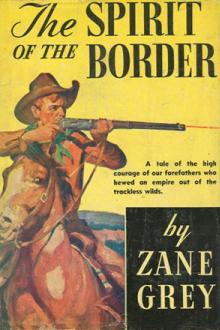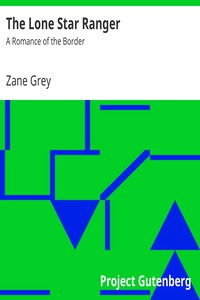The U. P. Trail, Zane Grey [robert munsch read aloud .txt] 📗

- Author: Zane Grey
Book online «The U. P. Trail, Zane Grey [robert munsch read aloud .txt] 📗». Author Zane Grey
“Does he have any idea—that I might return to him?” she asked.
“None, lass, none! Thet I’ll swear,” declared Slingerland. “When I left him at Roarin’ City the other day he was—wal, like he used to be. The boy come out in him again, not jest the same, but brave. Sendin’ thet gold an’ thet little book made him happy.... I reckon Neale found his soul then. An’ he never expects to see you again in this hyar world.”
35
Building a railroad grew to be an exact and wonderful science with the men of the Union Pacific, from engineers down to the laborers who ballasted and smoothed the road-bed.
Wherever the work-trains stopped there began a hum like a bee-hive. Gangs loaded rails on a flat-car, and the horses or mules were driven at a gallop to the front. There two men grasped the end of a rail and began to slide it off. In couples, other laborers of that particular gang laid hold, and when they had it off the car they ran away with it to drop it in place. While they were doing this other gangs followed with more rails. Four rails laid to the minute! When one of the cars was empty it was tipped off the track to make room for the next one. And as that next one passed the first was levered back again on the rails to return for another load.
Four rails down to the minute! It was Herculean toil. The men who fitted the rails were cursed the most frequently, because they took time, a few seconds, when there was no time.
Then the spikers! These brawny, half-naked, sweaty giants—what a grand spanging music of labor rang from under their hammers! Three strokes to a spike for most spikers! Only two strokes for such as Casey or Neale! Ten spikes to a rail—four hundred rails to a mile! ... How many million times had brawny arms swung and sledges clanged!
Forward every day the work-trains crept westward, closer and closer to that great hour when they would meet the work-trains coming east.
The momentum now of the road-laying was tremendous. The spirit that nothing could stop had become embodied in a scientific army of toilers, a mass, a machine, ponderous, irresistible, moving on to the meeting of the rails.
Every day the criss-cross of ties lengthened out along the winding road-bed, and the lines of glistening rails kept pace with them. The sun beat down hot—the dust flew in sheets and puffs—the smoky veils floated up from the desert. Red-shirted toilers, blue-shirted toilers, half-naked toilers, sweat and bled, and laughed grimly, and sucked at their pipes, and bent their broad backs. The pace had quickened to the limit of human endurance. Fury of sound filled the air. Its rhythmical pace was the mighty gathering impetus of a last heave, a last swing.
Promontory Point was the place destined to be famous as the meeting of the rails.
On that summer day in 1869, which was to complete the work, special trains arrived from west and east. The Governor of California, who was also president of the western end of the line, met the Vice-President of the United States and the directors of the Union Pacific. Mormons from Utah were there in force. The Government was represented by officers and soldiers in uniform; and these, with their military band, lent the familiar martial air to the last scene of the great enterprise. Here mingled the Irish and Negro laborers from the east with the Chinese and Mexican from the west. Then the eastern paddies laid the last rails on one end, while the western coolies laid those on the other. The rails joined. Spikes were driven, until the last one remained.
The Territory of Arizona had presented a spike of gold, silver, and iron; Nevada had given one of silver, and a railroad tie of laurel wood; and the last spike of all—of solid gold—was presented by California.
The driving of the last spike was to be heard all over the United States. Omaha was the telegraphic center. The operator here had informed all inquirers, “When the last spike is driven at Promontory Point we will say, ‘Done!’”
The magic of the wire was to carry that single message abroad over the face of the land.
The President of the United States was to be congratulated, as were the officers of the army, and the engineers of the work. San Francisco had arranged a monster celebration marked by the booming of cannon and enthusiastic parades. Free railroad tickets into Sacramento were to fill that city with jubilant crowds. At Omaha cannons were to be fired, business abandoned, and the whole city given over to festivity. Chicago was to see a great parade and decoration. In New York a hundred guns were to boom out the tidings. Trinity Church was to have special services, and the famous chimes were to play “Old Hundred.” In Philadelphia a ringing of the Liberty Bell in Independence Hall would initiate a celebration. And so it would be in all prominent cities of the Union.
Neale was at Promontory Point that summer day. He stood aloof from the crowd, on a little bank, watching with shining eyes.
To him the scene was great, beautiful, final.
Only a few hundreds of that vast army of laborers were present at the meeting of the rails, but enough were there to represent the whole. Neale’s glances were swift and gathering. His comrades, Pat and McDermott, sat near, exchanging lights for their pipes. They seemed reposeful, and for them the matter was ended. Broken hulks of toilers of the rails! Neither would labor any more. A burly Negro, with crinkly, bullet-shaped head, leaned against a post; a brawny spiker, naked to the waist, his wonderful shoulders and arms brown, shiny, knotted, scarred, stood near, sledge in hand; a group of Irishmen, red-and blue-shirted, puffed their black pipes and argued; swarthy, sloe-eyed Mexicans, with huge sombreros on their knees, lolled in the shade of a tree, talking low in their mellow tones and fingering cigarettes; Chinamen, with long pig-tails and foreign dress, added strangeness and colorful contrast.
Neale heard the low murmur of voices of the crowd, and the slow puffing of the two engines, head on, only a few yards apart, so strikingly different in shape. Then followed the pounding of hoofs and tread of many feet, the clang of iron as the last rail went down. How clear, sweet, spanging the hammer blows! And there was the old sighing sweep of the wind. Then came a gun-shot, the snort of a horse, a loud laugh.
Neale heard all with sensitive, recording ears.
“Mac, yez are so dom’ smart—now tell me who built the U. P.?” demanded Pat.
“Thot’s asy. Me fri’nd Casey did, b’gorra,” retorted McDermott.
“Loike hell he did! It was the Irish.”
“Shure, thot’s phwat I said,” McDermott replied.
“Wal, thin, phwat built the U. P.? Tell me thot. Yez knows so much.”
McDermott scratched his sun-blistered, stubble-field of a face, and grinned. “Whisky built the eastern half, an’ cold tay built the western half.”





Comments (0)